 |
|
|
 |
|
|
(No entries for September 28-30.)
|
2005
September
27
|
Katrina vs. Truth
I'm glad I'm not the only person who has noticed that
the news media's coverage of Hurricane Katrina
was massively inaccurate.
Death tolls of 20,000, snipers, gang warfare, unspeakable crimes
inside the Superdome... Not.
I don't want to disregard any tragedy, but for a while there,
the news media were doing a remarkably poor job of checking
their facts.
And they were showing us pictures, giving us the
false impression that we were really seeing everything
they were talking about.
Actually, all we were seeing was a flood.
But television creates a powerful illusion that if you are
seeing something with your eyes, then the words spoken with it
must be true.
The result? Massive complaining about how little was being done
by people who weren't actually the ones in charge (feds vs. locals) about a
disaster that wasn't as big as they were saying.
The Los Angeles Times had its say about all this in an
editorial today.
And meanwhile, on the radio today, I heard a media maven complaining
that President Bush wasn't watching TV coverage during the disaster.
I'm glad the newscasters don't control the Commander-in-Chief!
Permanent link to this entry

|
 |
2005
September
26
|
Servers, e-books, and cameras
At the AI Center, we're moving our web site
onto a new server.
As of now, www.ai.uga.edu
is 128.192.76.80.
If you cannot yet reach it by name, try its number.
The change does not affect this page, of course;
it's on www.covingtoninnovations.com.
For the past few days, Jeff Duntemann
has been asking how e-books could ever make money.
They're already doing it in one market: extremely specialized literature.
Scientific journals routinely will sell you a PDF of any article for
anywhere from $5 to $30.
See for example the
article in Brain
that I mentioned the other day.
Technical manuals are probably another market of exactly the same kind.
Some new astrophotos are coming very soon.
Checking specs, I realize that I did well to buy a Digital Rebel (EOS 300D) instead of
its successor, the Digital Rebel XT (350D).
The older, cheaper camera has bigger pixels (hence probably less noise),
more magnification in the viewfinder,
and a longer-lasting battery.
Permanent link to this entry

|
 |
2005
September
25
|
A dime from the previous century


Every day I take the loose change from my pocket and feed it into a
small gadget that sorts the coins.
Today the cylinder that holds dimes was full, so I got ready to put
them in a wrapper.
But one of them looked different...
It turned out to be a silver dime from 50 years ago, apparently
almost uncirculated, and now worth about $2 to a collector.
Its bullion value is about 52 cents.
This is not a rare coin by any means, but very little silver has circulated
since the 1960s.
Indeed, the bullion value of this coin is a handy measure of inflation:
the U.S. stopped issuing silver coins in the late 1960s, when the
bullion value first started to exceed the face value,
and since then, prices have risen approximately fivefold,
or the value of the dollar has shrunk by that factor,
depending on your point of view.
The picture was taken by laying the coin down on my scanner, with a gray book behind it,
and then slightly unsharp-masking the image.
Permanent link to this entry
Brain research
An interesting study of the writer Iris Murdoch, and how her Alzheimer's Disease
influenced her writing, has been
published in Brain.
The authors (P. Garrard and others) used computer language analysis similar to what
my research group has been doing.
Also in Brain is a study showing that
sleepwalking is closely related to sleep apnea
(a breathing disorder), and that treating the breathing disorder cures the sleepwalking,
whereas sleeping pills don't.
Other studies show that sleeping pills tend to cause sleepwalking rather than prevent it.
And the research about marijuana that I was
talking about recently is now starting to
influence public policy in Britain.
Permanent link to this entry

|
 |
2005
September
24
|
Fuel panic #2
Apparently fearing difficulty obtaining fuel for school buses,
the governor has asked Georgia's public schools to close on
Monday and Tuesday.
The announcement came after 3 p.m. yesterday, and with so little
advance notice, lots of working parents are going to have a lot of trouble
arranging day care for their children.
The University is staying open.
Permanent link to this entry
Short notes
I've been asked to write a book on
digital SLR astrophotography.
Should I?
Remember the old Speedball lettering charts?
They're online now.
To my astonishment, there is a web page for
Four Points, the tiny
settlement where my father grew up.
It's part of placenames.com,
an online directory of named places throughout the world.
Permanent link to this entry

|
 |
2005
September
23
|
Again
|
Maybe this will at least persuade New Orleanians
not to build it back just the way it was.
There are those who argue that flood insurance is a bad
thing because it encourages people to build in unsuitable
places.
A flood is not a misfortune happening to an individual
who can share his risk with other individuals;
when a flood happens, it hits everyone at once.
And while I have nothing but compassion for the victims,
I'm inclined to look askance at the rising expectation
that the rest of the U.S. taxpayers should bear the
expense when a city takes the consequences of being
unsafely built and badly governed.
|
|
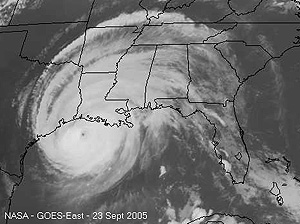
|
Permanent link to this entry

|
 |
2005
September
22
|
Free Opera
The Opera web browser is now completely
free and does not display advertising. (So how do they make money?
By selling "premium support" and by building browsers for platforms
more specialized than Windows.)
I started using Opera a year or two ago because it has tabbed browsing
(many pages at once), pop-up blocking, and the ability to magnify or shrink
the image on the screen.
The latest version also has a very handy "fit to page width" option
for printing web pages.
The feature it doesn't have, which I really miss from Internet Explorer,
is that you can't right-click on a
bookmark and choose "delete." I keep a lot of bookmarks only a short time, and it's
inconvenient to have to open up "Manage Bookmarks" to make deletions.
Also, a very few web sites don't work with it.
On the whole, though, I recommend Opera and am glad to recommend the new version.
It will install over your previous Opera,
preserving settings,
if if you take care to install it in
the same folder (which may not be the default).
Permanent link to this entry
Investment idea
MDY
is a passively-managed mutual fund
(meaning you aren't paying much for management)
comprising
Standard & Poor's 400 mid-cap stocks
(i.e., mid-sized companies, on the theory
that that's where the growth is).
The chart compares MDY to the Standard & Poor's 500
(large companies) and the Fidelity real estate fund,
which has risen more but is more volatile.
Permanent link to this entry
The ruins of McWhorter Hall

Here you see McWhorter Hall being torn down about a month ago. Nothing is left of it but rubble now -
and the magnificent Coverdell Health Sciences Center taking shape next door.
McWhorter Hall was the University of Georgia's athletic dorm in the 1970s.
Its purpose, as far as I could tell, was to insulate the football team from normal
student life.
I'm not the only person who felt that having an athletic dorm was rather
unsportsmanlike.
Athletic dorms were
banned
by the NCAA in the 1990s.
Football players are supposed to be bona fide students.
Those of us who believe college football is badly overgrown find in the NCAA an unexpected ally.
One of the NCAA's goals is to keep sports accessible to normal colleges and normal students,
not just a few superpowers.
Permanent link to this entry

|
 |
2005
September
21
|
Microsoft TS-CAL becomes an honor system
I've commented previously about Microsoft's
unwieldy licensing system
for Terminal Services clients,
i.e., people who use
Remote Desktop Protocol
to operate one computer through the screen and keyboard of another.
Well... This summer it apparently got so unwieldy that Microsoft had to
open up a loophole.
If you install Per User licenses, then reportedly, the server does not
keep track of how many of them are in use.
You still have a moral and legal obligation not to use more than you've
bought, of course, but according to
this web page,
the license count is not decremented when a license is issued to a user.
Microsoft should just go ahead and implement
"per connection"
licensing like everyone else:
let us buy a license that lets up to N people
connect at a time, regardless of who they are
or whether they've connected before.
Permanent link to this entry
Spammed by Cingular Wireless
This morning, while I was trying to sort out the TS-CAL business and answer e-mail,
my cell phone rang.
It was a text message from Cingular (my cell phone provider) saying, "Your cell phone
can now make international calls!"
This is the second unsolicited text message I've received from them.
The first was to solicit contributions for hurricane victims, and I had serious
doubts whether it was authentic, although in fact it was.
Well... A ringing telephone is an annoyance.
I'm already on the do-not-call lists.
I recommend that everybody do that I did: the moment one of these things arrives,
call Cingular Customer Service and complain.
They immediately put my three cell phones (mine, Melody's, and Cathy's)
on their do-not-spam list.
If every spam triggers a flood of immediate complaints,
they'll get the message.
Permanent link to this entry

|
 |
2005
September
20
|
Short notes
Error message: In yesterday's entry I made Internet Explorer reveal an error message
from the server; later in the day I found out that the error message was false or at
least misleading. "No authority can be contacted for authentication" doesn't mean there
are no authorities (i.e., logon servers)
accessible on the network; it means the authorities, such as they are, don't like your
user name and password.
Star-crossed film: My film from the great Canon Digital Rebel vs. Nikon D70s vs. Ektachrome E200 shootout
has finally come back from Color Genesis, who couriered it to E-Six Lab and back, and then the Color Genesis
courier had car trouble on the way to Athens, delaying it another day.
E-Six did a fine job of developing and mounting it.
Here is a hastily scanned picture from this roll, which may come very close to being my last roll of
film. One more minor advance in DSLRs, and film will have no advantages at all.
This is a 5-minute exposure of the Veil Nebula,
a supernova remnant in the direction of the constellation Cygnus,
on E200 pushed 1 stop, taken with a Nikon 300-mm f/4 lens
from my backyard.
This seemingly C-shaped gas cloud is actually part of a bubble.
One blunder: I had forgotten that a 1-stop push of E200 gives an effective speed of about 320, not 400.
So the film ended up about 1/3 stop slower than the digital cameras to which I was comparing it.
This is not a big deal because it took a 5-minute exposure on film to match 30 seconds on either
digital camera. Another third of a stop wouldn't have helped.
Book I want to read:
Reagan and Gorbachev:
How the Cold War Ended,
by Jack Matlock, who was our last ambassador to the USSR.
You can read part of it on line.
Key points so far: (1) Reagan's foreign policy was considerably more subtle and more peace-oriented
than the way the media portrayed it; (2) Reagan's key insight was that the Soviets operated by
a different system of ethics than us; they were not merely rivals in our own system of international politics;
they were playing a different game.
I was a guest in Mr. Matlock's house in 1974 when his son Hugh hosted a reunion
of the ten American students from the International Science School for High School Students,
which we had attended in Australia in 1973.
At the time, Mr. Matlock was a Soviet specialist in the State Department.
He didn't say much about international relations except to evince the opinion - obliquely -
that the Soviet Union wasn't going to last many more years.
And sure enough, it didn't, and he got to watch it collapse.
That may have been the most interesting job anyone in our Foreign Service has ever had.
Permanent link to this entry

|
 |
2005
September
20
|
When "friendly" isn't helpful
By default, Internet Explorer shows "friendly" HTTP error messages,
which means that when you connect to a web page that doesn't work,
you'll see something like this:
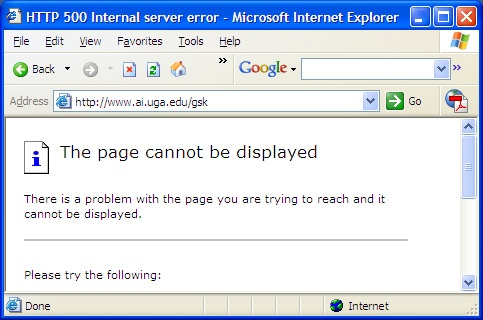
This more or less conceals what is really wrong,
because it's not the error message that came from the server -
it's part of IE's own help system, triggered by the
error code.
To see the real error message, if any, go to Tools, Internet Options,
Advanced, and uncheck "Show Friendly HTTP Error Messages."
Then you may be lucky enough to get something like this:
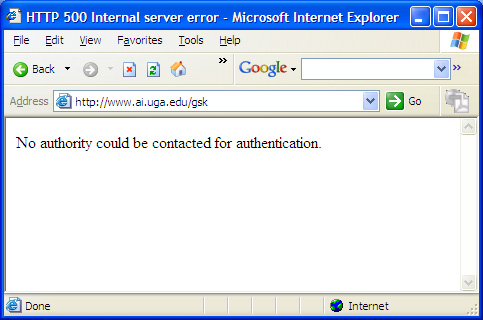
Appreciably more informative, especially if you are the person who
runs the server.
Permanent link to this entry

|
 |
2005
September
19
|
Reading matter
This week we have an unusually good crop of
News of the Weird.
Also, for church history buffs, a nice essay about
the Tractarians
with lots of links.
And, for church workers of all sorts, a question-and-answer by a Catholic priest
(deacon? I'm not sure)
about
what
to do if someone keels over
during a service you're conducting.
In one case he was told, during a service, that a parishioner had died then and there,
which turned out not to be the case.
[Note added Sept. 20: I hasten to add that I don't mean to appear flippant.
In the situations described, others had already provided emergency assistance.
The question is whether to interrupt the service, and the recommendation is generally no.]
Permanent link to this entry

|
 |
2005
September
18
|
Anniversaries, radio valves, and structured programming
Today is the 50th anniversary of the
conquest of Rockall
and the 32nd anniversary
(a nice round number, in binary)
of my arrival in Georgia to study at The University of Georgia.
The classic Radiotron Designers' Handbook, the best
electronics reference book of the 1950s, has been
placed online
by a helpful person at Rutgers.
If you ever want to know exactly what an AM radio or an ordinary loudspeaker
has to do, or if you need to debug a tube circuit, this is the book to read.
It's refreshing to see a lot of things explained from first principles
in a different way than is customary today.
Although sold by RCA in the United States, the book was written
and first published in Australia,
where tubes are called valves.
Abolishing GO TO ? Should computer programmers be forbidden to
use the go to statement?
Debate breaks out periodically.
Around 1968, E. W. Dijkstra pointed out that the go to statement
is error-prone because it makes it too easy to jump from any point in a program
to any other point.
Extremely disorganized, wandering computer programs were common at the time.
Modern programmers almost always use other structures - if-then-else
for instance - as alternatives. It's much clearer what these structures do, and most
importantly, their effect is confined to a small part of the program -
you can be sure that execution is not going to jump into them from an unknown place
several pages away.
But there are many for whom avoiding go to has become a matter
of chauvinism.
Last night, someone told me he would not allow any programmer in his employ to
code a go to statement, ever.
I replied: There are a few algorithms that become clearer and less error-prone
if you do use go to. They're rare, but I don't go a year without
coding one (and I'm not a full-time programmer, though I do deal with greater than
the usual variety of things).
In particular, a key principle of reliable programming is
not to express the same idea more than once.
Your two expressions of it may not be identical, and in particular,
when the program needs to be revised, the two may not stay identical.
There are algorithms where avoiding go to requires you to perform
the same test more than once.
Why would anyone want to be such a purist that he renders himself unable
even to think about such algorithms?
This isn't news. Almost all of it was worked out by Knuth in 1974.
A nice modern summary by Steve McConnell is here.
Amid all this anti-go-to sentiment, I'm puzzled as to why there is almost no
anti-pointer sentiment.
The unrestricted use of pointers in C and C++ is the source of nearly all
unrelability and security holes in modern software.
(Why should there ever have been such a thing as a buffer overrun?)
Pointers do to memory what go to does to program logic.
Let's get rid of them.
Permanent link to this entry

|
 |
2005
September
17
|
Miscellany
I am now the writer of an advice column for astrophotographers
in
a new online magazine, AstroPhoto Insight.
Home page here.
I answer 1 question every 3 months, so get your requests in right away!
You can now download a free demo of
TIP, the performance management software that I've been
involved in developing.
Along the way, I've learned that an awful lot of Windows users now have
Microsoft .NET Framework 1.1
already installed, whether they know it or not.
It comes in with Windows Update.
To find out whether you have it, look at Control Panel, Add/Remove Programs.
This is good news because
I'm a
strong advocate
of the .NET programming environment.
As soon as everybody has it,
I get to stop telling them they need to download it
in order to run my programs.
In the meantime, I've made my own
.NET download page.
I've also learned that .NET executables generated with Visual Studio 2003 politely
tell you if you need to install .NET and haven't done so.
That's an improvement over Visual Studio 2002, in which they would simply tell you
that you needed MSCORLIB.DLL, whatever that might be.
(It's the .NET core library, of course.)
Fractal music: Wolfram Research has a web site where you can
listen to
music composed, on the spot, by a computer.
They do it by mimicking the fractal structure of the music, and, frankly, I'm underwhelmed.
It sounds like inept, shapeless jazz improvisation.
(Or maybe I visited it on a bad day.)
Back in 1975 (yes, 30 years ago!) I experimented briefly with having a computer
compose music in the form of a constrained random sequence - basically an early
approach to a
generative grammar for music.
(Jackendoff and Lerdahl's work had not come out yet.)
It sounded plain but not shapeless.
Financial corner:
Investment guru says
not to invest in Kodak,
which is still being devastated by the digital revolution,
despite making some of the best CCD image sensors in the business.
Today's scare:
online payday loans,
offered through the Internet to avoid local regulation.
Folks, if you go for one of these, you're giving personal financial information to
a complete stranger who is probably already on the wrong side of the law.
Is there anything people are smart enough not to do?
Good advice:
Never co-sign on a loan.
If you do, you're taking a risk that the lender wouldn't take. It's that simple.
This had better be a hoax: The Guardian, a major British newspaper,
reports that the Chinese are making
cosmetics out of dead people.
Permanent link to this entry

|
 |
2005
September
16
|
Evacuating the University?
[The following is approximately the text of a letter I sent to the local
newspaper
today. We'll see if they publish it.]
If the
Morehead task force
wants to make UGa a "seven-day-a-week university"
or even a five-day-a-week university,
they might start by ending the practice of shutting down
and evacuating the campus for every home football game.
For the third Friday in a row, I've had to dismiss an afternoon class early
so the students can make the 5:15 deadline for removing their cars from the
central area of the campus.
Yes, this even applies to students who live in the dorms.
They have to vacate the parking spaces they've paid for near their dorms
and move their cars to lots
that are hardly within walking distance.
Besides being inconvenient, this sends
entirely the wrong message about what the University
considers important.
This isn't an elementary school that dismisses at 3 p.m. every Friday.
Students need weekend, or at least 5-day-a-week, access to libraries,
studios, and laboratories. And to the buildings in which they live!
It's time for the University to get serious about not letting athletic events
interfere with the education that the students are paying for.
It's also time to start asking some hard questions about whether the Athletic
Association raises money for the University or only for itself.
Most Bulldog fans and many donors are probably unaware that the
two are separate organizations.
Permanent link to this entry

|
 |
2005
September
14-15
|
EXIFLOG, a digital photo logging program
Instead of writing notebook entries, I've been busy
writing
this.
Permanent link to this entry

|
 |
2005
September
13
|
Ending the E-6 era a bit too quickly
Last November was the last time
I tried to have a roll of color slide film processed.
Colorchrome sent it back, saying they no longer do E-6, so I sent it to Color Genesis,
another Atlanta lab, which did a fine job.
Well, this morning I mailed off another roll to Color Genesis.
(It had been 10 months since I had used any slide film!)
And right after it went out, I got their answer to an earlier e-mail,
saying that they, too, no longer do E-6 (Ektachrome/Fujichrome) processing.
Fortunately, all is not lost. They have a daily courier to
E-Six Lab, which is
apparently the last stronghold of Ektachrome in Atlanta, and they'll get
it processed for me. (Sigh of relief.)
But the film era is ending a little faster than I wanted it to.
At least I'm not using Kodachrome.
There are only
3 labs in the entire world
that still process it!
Incidentally, rumors were flying last week that Kodak was about to be bought out by
Hewlett-Packard. It didn't happen, but...
Permanent link to this entry
Imminent death of the Net predicted achieved (?)
On September 1, without warning, my DSL provider,
Speedfactory,
terminated its Usenet news server.
I've been talking about the
risk
that Usenet will suddenly die off for some time.
Well, apparently this is another nail in its coffin.
Even so, it was uncouth of Speedfactory to discontinue a service I was using, without
notifying me in advance.
I'm going to change my DSL service to
Bellsouth, which is considerably cheaper and
may even still have a news server.
I can still get to Usenet through
Google Groups,
but I don't really want to support Google's attempt to monopolize what used to be
the world's greatest distributed information resource.
Before we had the Web, we had Usenet.
Permanent link to this entry

|
 |
2005
September
12
|
Joystick-port interfacing
Back in 1985, I wrote an article for PC Tech Journal titled "Joystick Metrics"
about how to use the IBM PC joystick port (game port) to measure voltage, temperature,
light level, and so forth. I updated it in 1994 for PC Techniques.
I'm still getting inquiries about it, so I've put it on the web
here, in PDF.
Please note: This is software for DOS and probably does not run under
current versions of Windows. The circuits are still relevant but the software
will probably need to be entirely different nowadays.
And no, I will not do any more work on it
unless someone pays me to.
(That includes helping people get it working.)
This is a project from 20 years ago!
However, if anyone develops Windows 2000/XP software for doing the same thing, I'd be
glad to hear about it.
Permanent link to this entry
A mixed bag of local news
Cathy has again been
pelted with chicken bones.
It seems to be an annual event.
Meanwhile, Athens, Georgia (pop. 100,000), may be the largest town in the United States
with
no Ford dealer.
(Registration is required to read this newspaper story. The gist of it: The local dealer fell on hard
times and is closed; all the cars have been repossessed.)
And our students are grumbling about having to
remove their
cars from campus on football Saturdays, even if they live on campus.
I agree with the grumbling!
I teach a course that runs until 5:30 on Fridays - except when there's a football game.
Then I have to dismiss the students early so they can begin the evacuation.
Something I wouldn't know if I didn't occasionally listen to talk radio:
Among a certain set of people, "I'm on the Internet" means
"I'm listed by an online dating service" (not just "I have e-mail and a web page").
So if somebody asks you if you're "on the Internet," be cautious.
Permanent link to this entry

|
 |
2005
September
11
|
Saving money and saving the earth
Usually, people pollute the environment and waste energy because it's cheaper than
the alternative. New energy sources and more efficient cars and appliances cost money.
But there is one simple way we Americans could reduce pollution and save energy
and end up with more money in the bank.
Small businesses and local governments would save the most money.
How?
By reducing wasteful outdoor lighting.
I don't mean taking away any lighting that actually helps people see things.
I mean switching to more efficient kinds of bulbs and - most importantly - shielding the
light fixtures so they actually illuminate the ground, buildings, etc., rather than
shining into the sky or into people's eyes, thus getting a lot more illumination per watt.
The power companies love it when they can persuade somebody to buy electricity
and throw it away, especially at night, when most people aren't buying much.
And the easiest way to throw electricity away is to shine lights where they don't
benefit anybody.
Unless you're signaling aircraft, there's no reason to shine a light directly upward.
But the University of Georgia has plenty of Victorian-style ball-on-a-stick streetlamps
that send more than 50% of their output upward.
Then there's the old "security light" trick - persuade people to install "security lights"
to burn all night where nobody will ever see them.
For the power companies, this is a captive clientele, paying money without knowing it
for something absolutely useless.
Waste isn't the only problem. Shining lights in people's eyes can be dangerous.
We have lampshades in our living rooms - why not outdoors?
Unshielded lights can keep you from seeing things, by creating glare
and harsh shadows.
The cost of wasteful lighting in the United States is estimated at $20 billion per year.
Naturally, making all that electricity consumes fuel and pollutes the air.
But there are also direct environmental effects of excessive lighting.
Trees and birds suffer measurable damage, and we don't know enough about
what happens to other
living things when you shine lights on them 24 hours a day.
I know I wouldn't want that done to me.
Astronomers
are especially concered about wasteful lighting because they're in a position
to measure it; wasteful lighting keeps us from seeing the stars.
But it's not an astronomy issue. It's an environmental and financial issue.
There was a very good
talk on wasteful lighting
at last night's meeting of the
Charlie Elliott Chapter of the Atlanta Astronomy Club
(so called because it meets at the
Charlie Elliott Wildlife Center).
I got there for the first time in 3 years!
It was my regular dark-sky observing site until I found some nearer Athens.
Permanent link to this entry

|
 |
2005
September
10
|
Nebulae, space ships, and super-meteors
Lots of astronomy... Last night I went out into the country and took a huge
number of astronomical photographs. It was the first dark-sky trip with the
Digital Rebel, and I was gratified to be able to photograph the North America
Nebula with this camera even though it has not been modified to increase its
sensitivity to deep red light, which is what the nebula mostly emits.
Here's a very rough version of the image: no dark frame subtraction,
very klutzy level adjustment and nothing else.
This is a 5-minute exposure with a Nikon
300-mm f/4 lens attached to the Canon with an adapter.
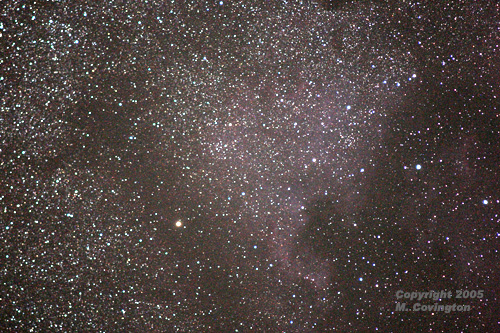
My best film image of it, taken 2 years ago, looks like this:

This was taken with Ektachrome E100GX film, which is especially sensitive to deep red light.
A Digital Rebel can have its infrared-blocking filter removed to give much the same
response.
We can credit Hurricane Ophelia for this clear weather.
Recall that the hurricane rotates counterclockwise and is pulling
clear northeastern air into Georgia. I am at the red dot in this
satellite map, which shows water vapor levels at 11:15 p.m. last night:

While I was out there, my host asked me if I'd ever seen anything unidentified
that I thought might be an alien spacecraft.
The answer was no, but I also remarked that
from any appreciable distance, their spacecraft would look just like ours - just
specks of light - so how would I know?
I see man-made satellites every night, and I rarely look them up and identify them.
Then, when I got home and was unpacking, at 1:04 a.m. I observed
the brightest meteor I've ever seen, except that I didn't actually
see it.
Something lit up my surroundings, as if somebody were welding, or burning a strip of magnesium,
a few hundred feet away.
I turned around and saw the meteor finish up as a streak of bright white sparks,
in the southwestern sky, above and to the right of the star Fomalhaut.
It definitely didn't reach the ground.
Permanent link to this entry

|
 |
2005
September
9
|
An odd thing to criticize someone for
Well, he started out to make sense.
That's about all I can say in favor of
this column,
widely reprinted in newspapers nationwide,
in which Richard Cohen
criticizes Judge Roberts for not being a failure.
If Mr. Cohen's point were merely that temporary failure can be overcome, and can even be
a character-building experience, then I'd agree.
But does it follow that a man who has not failed is thereby unqualified for high office?
"His record is appallingly free of failure," says Cohen about Roberts.
From this he argues that Roberts will not sympathize with oppressed or downtrodden people.
That, of course, does not follow. There are much more direct ways to find out what the
judge thinks about oppressed or downtrodden people.
Or maybe Cohen means something much simpler:
"We can't find any dirt on Judge Roberts so we're going to criticize
him for not having any dirt!"
There have been times when that kind of criticism has been tried on me.
Permanent link to this entry

|
 |
2005
September
8
|
Mars
 Last night may have been the first really clear night since May or earlier.
I took dozens of astronomical photographs, most of them as part of a
"Nikon vs. Canon shoot-out" about which I'll report more later.
(It was a comparative test of Nikon D70s and Canon Digital Rebel cameras
under identical conditions with the same lens.)
Last night may have been the first really clear night since May or earlier.
I took dozens of astronomical photographs, most of them as part of a
"Nikon vs. Canon shoot-out" about which I'll report more later.
(It was a comparative test of Nikon D70s and Canon Digital Rebel cameras
under identical conditions with the same lens.)
But I also managed to grab some video images of Mars with the ToUCam.
Here you see the best 600 of a 1000-image sequence, aligned and combined
with RegiStax.
This is not a very good picture of Mars, but it's as good as anything I ever got
during the film era. You can see the south polar cap at the top and Mare
Erythraeum in the middle.
Permanent link to this entry

|
 |
2005
September
7
|
The Scutum star cloud
Below you see a thick cloud of stars in the Milky Way.
This one is in the small constellation Scutum and includes
the star clusters M11 (overexposed, left of center) and M26 (below center),
as well as many other clusters and several dark nebulae
(patches of dust obscuring the more distant stars).
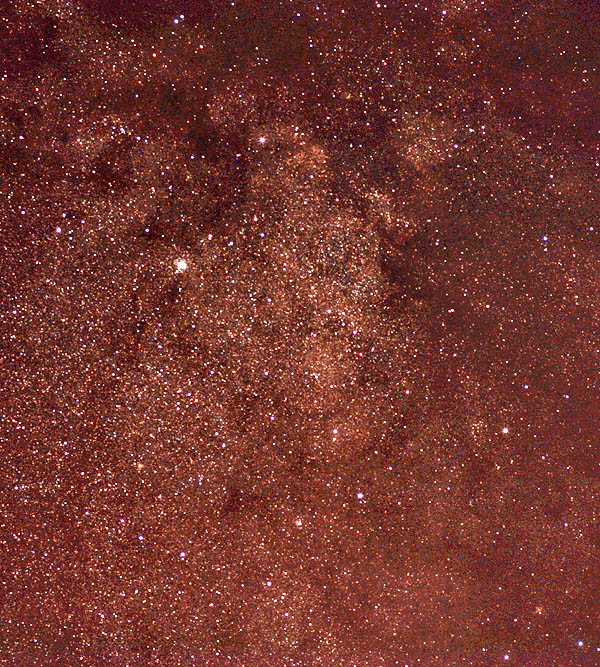
This is a stack of three 5-minute exposures with a Digital Rebel and a Sigma 105/2.8
lens at f/4. The camera was set to ISO 200 and dark frames were subtracted in the
normal way. The image was then unsharp-masked with Photoshop.
Scutum is not one of the constellations we inherited from the Greeks and Romans.
It was introduced in 1690
by Johannes Hevelius to honor the King of Poland for fending off the Ottoman Empire.
Permanent link to this entry

|
 |
2005
September
6
|
Notes from all over
His and hers finances: A while back I was sharply critical of
TV financial adviser Suze Orman's recommendation that married couples
should have 3 checking accounts - his, hers, and theirs.
I stand by what I said, but a correspondent, who does not want to be named,
notes that there's a good reason a husband and wife might want to have
separate emergency savings accounts.
One of them might be hit by a lawsuit, a business disaster, or even
a mental illness that makes them incapable of managing their money
or impossible to live with.
The spouse would benefit from having money stashed away to subsist for a
few weeks or months while the crisis is resolved.
Melody and I don't have separate savings, but I understand the rationale.
New Orleans: The tragedy is mind-boggling, and now it's
coming out that part of the problem is that a remarkable number of
people refused to evacuate and are refusing to evacuate even now,
even though they're being told they'll have no drinking water,
food, or electricity for weeks or months.
Do people have a right to squat in a ruined city and demand that we
keep bringing them things? I don't think so. That evacuation order
should have had more teeth in it.
Another factor is that New
Orleans' severe poverty has been too well hidden from everyone for too long.
Apparently, even the local authorities weren't fully cognizant of it during the evacuation.
|
How to draw a British flag:
The authoritative geometrical construction is
here.
Why it's authoritative, I'm not 100% sure.
I presume the author looked up the official specifications.
[Yes, he did; particulars are in a footnote on the site.]
Some people don't realize that the diagonal red cross (for Ireland) is offset
anticlockwise. (That's how you can tell the front of a Union Jack from the back.)
And a lot of renderings don't offset it far enough; the edge of the red should fall
in the center of the white stripe, hitting the exact corners of the flag.
|
|

|
Here
is the prettiest
paperweight I've seen lately, based on a coin of Queen Victoria.
What I couldn't get anybody to believe 5 years ago:
Computer viruses come from
organized crime,
or at least organized groups of people who are breaking the law for money.
The BBC reports that one of the recent virus outbreaks was designed specifically
to turn off pop-up-ad blocking on the victims' machines, and the virus writer was
expecting payment from the advertisers.
Elsewhere I've heard of viruses whose goal was extortion - "pay me to stop the damage."
Society needs to let go of the notion that viruses and cracking are the work of naive 13-year-olds
who deserve only a slap on the wrist.
That, of course, is what the virus authors and crackers want us to think.
One of the worst movies ever made: The talk of the town in Valdosta, Georgia, in the
summer of 1971 was a movie that a Hollywood producer was filming in Valdosta, using many
local people as actors.
I was there but didn't get into the movie; nor have I ever seen the movie, which is
apparently fortunate.
On the Internet, you can get information about anything, so I decided to look up this movie
last night. It was titled Like a Crow on a June Bug, and the reviews agree with
everything I heard about it at the time: it was just awful, full of insulting stereotypes
about the South.
(Why do Americans think bigotry is OK if the victims are other regions of their own
country?)
I remember that a lot of the local actors were dismayed when they found
out what a dreadful movie they had gotten into.
The movie did contain one Hollywood big name (Mercedes McCambridge; reviewers have since
speculated about how she sank so low). It apparently sold so poorly that it was
released again under two different titles (Sixteen and something else) in the hope
that the audience wouldn't realize it was the bad one they'd already heard about.
An Englishman is selling an early-20th-century
Troughton & Simms reflecting telescope.
Click on the picture on his web site for lots more pictures.
That is workmanship to admire!
Permanent link to this entry

|
 |
2005
September
5
|
Labeling coaxial DC connectors
I spent an hour, two nights ago, soldering a coaxial DC plug onto a new
power supply for my SBIG STV autoguider.
By a coaxial DC plug I mean one like these:
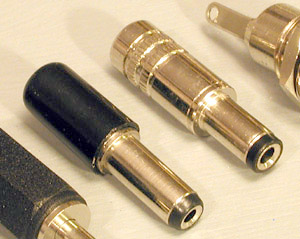
The catch is, I had to do it backward. Most 12-volt power supplies, if they
use a coaxial cable, have the shield negative and the center conductor positive.
So did this one. But SBIG wants it the other way around, with the center part
of the plug negative. So I had to
swap the shield and the center when attaching the plug.
I accomplished this by splicing the wire, after several failed attempts to
make the swap within the plug itself.
Then I had to document what I had done. In the process, I stumbled on a
quick, convenient notation. Here you see the usual notation at the top,
and my substitutes at the bottom:
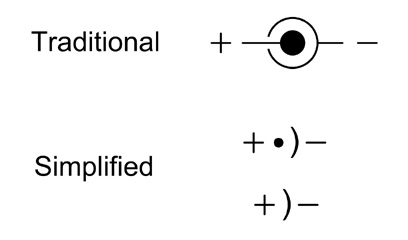
Crucially, my notation can be typed on a Brother labelmaker.
Here's an example of a Brother-made label, stuck over the manufacturer's
original polarity diagram:
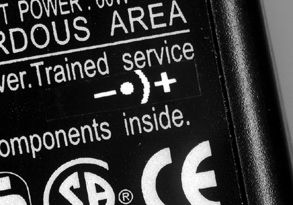
Maybe that will make it easier for us to mind our pluses and minuses.
Permanent link to this entry

|
 |
2005
September
4
|
Amateur astronomy
This weekend I managed to find some hobby time and write four
articles for Astromart, namely:
Read them and enjoy.
Permanent link to this entry

|
 |
2005
September
3
|
Radiation and computer safety
It's a small thing, but it's also a textbook case of something that shouldn't happen,
so I'll record it here.
I was at the dentist (I won't say which dentist) having my regular X-rays taken,
using digital imaging, of course.
The computer kept sounding the "bong!" that indicates something going wrong, and when I
prodded the technician to look at it, she read out an error message about "cannot
create file."
She continued with the X-rays.
Then it was discovered that the server had come disconnected from the network, and half
of my X-ray images were lost.
So I had one side of my mouth X-rayed again.
It didn't cost me anything but the unnecessary radiation exposure.
Still, it's a textbook case of a patient being exposed to more radiation than
necessary because a human being was ignoring error messages.
Permanent link to this entry

|
 |
2005
September
2
|
Planets among the trees
|
Yesterday and the day before, Jupiter and Venus were very close together in the sky - only
1.3 degrees apart. Here's what they looked like.
This was taken about 45 minutes after sunset,
with the Nikon D70s, 50-mm f/1.8 lens at f/4, auto-exposed, and cropped and
adjusted with Photoshop.
It's uncommon to see two planets this close together in the sky.
Of course, the event has no physical significance; Venus (the bright one) is much closer
to us than Jupiter.
Near the top of the picture you can see the star Zeta Virginis.
|

|
Permanent link to this entry
A better Opera
I've just upgraded to version 8 of the Opera web browser.
(Get it here, free.)
Opera gives you tabbed browsing -
you can open a lot of web pages at once in the same window and access them through tabs at
the top. This is much better than Internet Explorer's completely separate windows, which
are hard to keep track of.
Opera 7 was rather bad at printing web pages.
But Opera 8 is much better, and it has a really handy feature: a
"fit to page width" option when printing.
This is vital when my bank, for instance, gives me data on a page that was obviously designed to
be viewed with the biggest screen in the computer store.
Opera will also let you scale the size of the image (50%, 80%, 100%, 120%, 200%, etc.)
on your screen.
Thus you can overcome the mistakes of web designers who made something the wrong size.
What I still don't like about Opera is that you can't delete a bookmark by just
right-clicking on it and choosing Delete. You can add bookmarks easily, but you
have to open up the Manage Bookmarks page - a big tree structure - to delete any of them.
I'm not chauvinistic about web browsers. I don't hate Internet Explorer, nor do I love Opera.
I use both of them for different purposes.
Internet Explorer 7 will support tabbed browsing and the "fit to page width" printing option.
If I like it, I'll switch to it.
I also hear good things about Mozilla Firefox but am not presently using it.
What I think is important is to have multiple browsers in use in the world, so that HTML
remains a portable standard.
I still remember all those web pages, in the 1990s, that said "Best viewed with Netscape 4.5" or
whatever (some of which wouldn't even work with higher versions of Netscape).
Folks, if it's not viewable with more than one browser, it's not a web page!
Permanent link to this entry

|
 |
2005
September
1
|
|
How to help
The most efficient way to help the hurricane victims is through existing
church-related charities because they have very low overhead costs.
I recommend the
Baptists
and the
Catholics
because of their proven record of effectiveness and their strong
presence in Louisiana and Mississippi.
If you don't want to donate to a church agency,
donate to the
Red Cross.
Beware of new or unfamiliar charities, no matter how well intentioned.
Do not respond to e-mailed or telephoned appeals
from organizations that you do not already know.
Note in particular that e-mail solicitations may be fake,
even if they use the name of a well-respected charity.
|
Devastation
[See comments on September 27.]
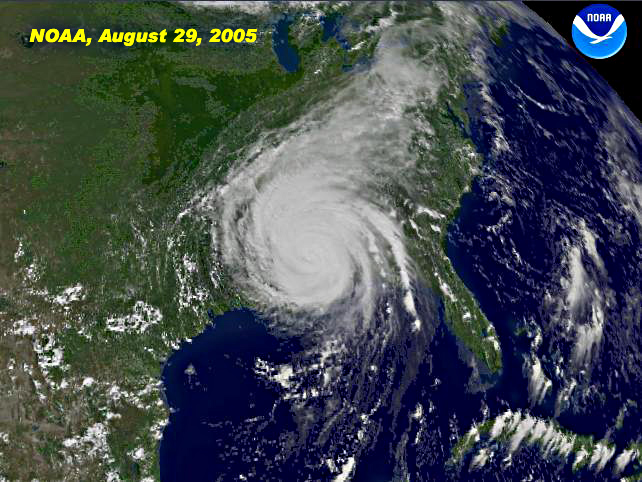 Our prayers are with the people of Louisiana and Mississippi as they try
to recover from the damage caused by Hurricane Katrina.
The full extent of the devastation is apparently not yet known.
Large parts of two states are uninhabitable and incommunicado.
The human tragedy is immense, and the worst is yet to come, as
diseases break out because of the lack of sanitation.
Our prayers are with the people of Louisiana and Mississippi as they try
to recover from the damage caused by Hurricane Katrina.
The full extent of the devastation is apparently not yet known.
Large parts of two states are uninhabitable and incommunicado.
The human tragedy is immense, and the worst is yet to come, as
diseases break out because of the lack of sanitation.
There is beginning to be some doubt whether New Orleans ever will
be entirely rebuilt. Perhaps what we've experienced is like the sinking of Atlantis.
New Orleans has been sinking slowly for 200 years, and maybe now the ocean
has claimed it and won't give it back.
At the very least,
I hope every engineer in the world speaks up and says, Don't build it back
just the way it was, and certainly not with taxpayer money.
If you build it back, build it better.
At the very least, set up a grid system of Dutch-style dikes so that the whole city
can't be flooded by one breach.
Or maybe just move to higher ground. Unlike the Dutch, we have plenty of room upriver.
Permanent link to this entry
The great gasoline panic of August 31, 2005
[Revised later in the day.]
James Thurber would have loved this...
Two nights ago (Aug. 30), the price of gasoline around here was still $2.69 a gallon, but the news
media were making a few comments about the possibility of a shortage.
Yesterday (Aug. 31), around noon, rumors started spreading all over Atlanta and Athens that we'd all
better buy gasoline right away because there wasn't going to be any more.
In Athens, the rumor was very specific: the police were going to "shut down all the
gas pumps" at 3 p.m.
Immediately cars lined up at gas stations, and some people waited hours for fuel.
Some, in Atlanta, paid over $5 a gallon. Others drove from Atlanta to Athens (75 miles!)
to get gasoline.
Naturally, a few gas stations ran out of gasoline, and that really contributed
to the panic.
But the shortage was very patchy. Thirty miles north or south of Athens - and even at some
gas stations within the city, away from major highways - there was plenty of gas,
no long lines, and only small price increases.
What happened? I don't know. What I know is that the rumor spread mainly by cellular
telephone. Office workers and University students spent the early afternoon calling
each other and spreading the word.
Conceivably, the trigger might have been someone overhearing a message, on a police
radio, that the police were shutting down some of their own gas pumps.
Another triggering factor may have been that, the night before the panic, WSB-TV mentioned, in a teaser,
that they had "just found out what the Governor of Georgia is going to do about the gasoline
supply." (Stay tuned and find out.)
Many of us suspected there might be price controls, leading to shortages.
What the governor actually
did was suspend a rule requiring different formulations of gasoline in the summer
than in the winter - and I think this was an eminently sensible move.
Any winter fuel that is still around can be sold as needed.
He also, later on, declared a state of emergency
with
price controls, but he did this right around the time the prices were at maximum, so it had little
effect.
Today (Sept. 1), gasoline costs $3.39 per gallon and is plentiful.
Permanent link to this entry

|
 |
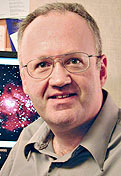

![]()









 Last night may have been the first really clear night since May or earlier.
I took dozens of astronomical photographs, most of them as part of a
"Nikon vs. Canon shoot-out" about which I'll report more later.
(It was a comparative test of Nikon D70s and Canon Digital Rebel cameras
under identical conditions with the same lens.)
Last night may have been the first really clear night since May or earlier.
I took dozens of astronomical photographs, most of them as part of a
"Nikon vs. Canon shoot-out" about which I'll report more later.
(It was a comparative test of Nikon D70s and Canon Digital Rebel cameras
under identical conditions with the same lens.)





